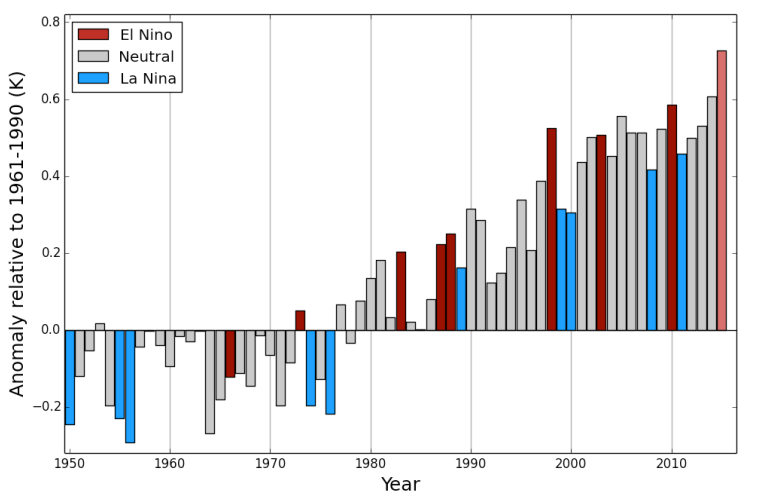Home » Posts tagged 'carbon brief' (Page 3)
Tag Archives: carbon brief
In-depth: the scientific challenge of extreme weather attribution
Working out whether human activity is supercharging extreme events, such as floods, storms, droughts and heatwaves, is one of the youngest branches of climate science. But it’s moving at breakneck pace.
So much so, that the US National Academy of Sciences has fast-tracked a report, published today, taking stock of the science and where it’s heading.
Event attribution is the field of science that asks if extreme weather around the world would look any different if we could replay the last 200 years or so, without human-caused greenhouse gases.
Today’s report is an overview, rather than a showcase for new results. And at about 150 pages long, it’s not a light read. But its weightiness is apt for a topic that has come to underpin climate conversations everywhere from flooding in the UK to climate change adaptation.
Carbon Brief has been speaking to key scientists in the world of attribution about how far the science has come, experimenting with communicating the nuances, and the thorny issue of making results public at lightning speed, often before peer review.
One thing is for sure, Dr Heidi Cullen, chief scientist at Climate Central and a contributor to today’s report, tells Carbon Brief:
‘A universal talking point’
Storms, droughts, heavy rain, heatwaves and other extreme weather events are of huge interest to society because of their often disastrous consequences for people and property.
As Prof Ted Shepherd, professor of climate science at the University of Reading in the UK, explains in a recent commentary in the journal Current Climate Change Reports:
…click on the above link to read the rest of the article…
IEA: China might have passed ‘peak coal’ in 2013
IEA: China might have passed ‘peak coal’ in 2013
China possibly saw its coal consumption peak in 2013, according to the International Energy Agency (IEA).
The seismic shifts underway in China have global implications for both coal use and emissions.
Global coal use fell by 0.9% in 2014, the first fall this century, says the IEA’s Medium Term Coal Market Report 2015. It says demand is “likely” to fall again in 2015, echoing reports that global emissions will fall this year as coal use declines.
As a result, the IEA’s 2020 demand coal forecast is now 10% lower than its previous outlook. Even so, it sees rising demand between now and 2020, reversing the current two-year decline.
Paris perspective
Before getting into the details of the IEA’s coal market report, it’s worth noting that it was written before the Paris climate deal was agreed.
Anticipating that an agreement might be reached, however, the report lays out a series of trends likely to weigh increasingly on coal demand over the coming years.
These include the falling cost of renewables, the spread of CO2 pricing and coal taxes, the divestment movement and development banks and export credit agencies restricting coal finance.
Fatih Birol, the IEA’s chief executive, writes in a foreword to the report that the business case for coal use is diminishing. He writes: “The window of opportunity for high-carbon sources is closing.”
A feature article for the New York Times this week looks at the mass layoffs facing China’s coal mining industry. One miner tells the paper: “There is no future in coal.”
While some reports suggest the Paris deal depressed coal stocks, views differ on its significance for fossil fuel interests. Nonetheless, it would be hard to argue coal’s prospects have improved.
With that in mind, let’s turn to the forecasts in the IEA’s medium-term coal market outlook.
…click on the above link to read the rest of the article…
Hottest five-year period on record is 2011-2015, says WMO
Hottest five-year period on record is 2011-2015, says WMO
The World Meteorological Organisation (WMO) announced today that 2015 is likely to top the charts as the hottest year in modern observations, with 2011-15 the hottest five-year period on record.
With two full months still to add in, the global average surface temperature for January to October in 2015 was 0.73C above the 1961-1990 average. This already puts it a long way above 2014, in which average global temperature reached 0.57C above the 1961-1990 average.
This year’s record is down to a combination of rising greenhouse gases and a boost from the strong El Niño underway in the Pacific, says the WMO.
Today’s announcement is timed to coincide with the gathering of world leaders on Monday to begin talks in Paris aimed at striking a deal to reduce global emissions.
‘Significant’ milestone
To put today’s news another way, global temperature in 2015 is likely to pass the “symbolic and significant” threshold of 1C above preindustrial levels, says the WMO.
This follows the recent announcement from the Met Office that temperature in the HadCrut4 dataset – one of three global datasets the WMO uses – is expected to pass the 1C mark in 2015. Dr Ed Hawkins from the University of Reading said today:
Roughly 1.0 degrees Celsius of this warming, or around 95%, is due to human activity. Natural cycles in the climate system, including El Nino, solar activity and natural variations in weather, are likely to be responsible for the remainder of the warming.
Earlier this month, the WMO said greenhouse gases in the atmosphere had reached a new high, with spring concentrations in the northern hemisphere exceeding 400 parts per million.
…click on the above link to read the rest of the article…





